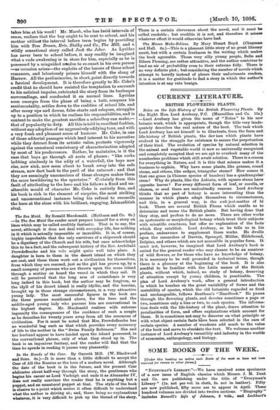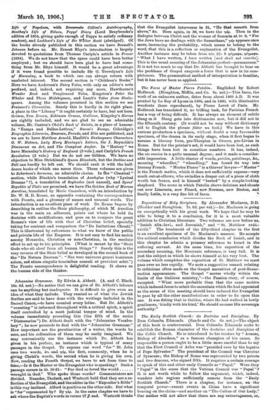SOME BOOKS OF THE WEEK.
[Under this heading we notice such Books of the week as hays not been reserved for review in other fortes.]
" EVERYMAN'S Lisaanv."—We have received some specimens of a new issue of English classics which Messrs. J. M. Dent and Co. are publishing under the title of "Everyman's Library" (1s. net per vol. in cloth, 2s. net in leather). Fifty are now published, fifty more are to appear in April. These hundred volumes are divided into twelve sections. "Biography" includes Boswell's Life of Johnson, 2 vols., and Lockhares Life of Napoleon, with Benvenutollini's Autobiography, Southey's Life of Nelson, Pepys' Diary (Lord Braybrooke's edition of 1854, giving quite enough of Pepys to satisfy ordinary readers), and Lockhart's Life of Sir Wt.lter Scott (abridged). Of the books already published in this section we have Boswell's Johnson before us. Mr. Ernest Rhys's introduction is largely devoted to quotations from Thomas Carlyle's article in Fraser (1834). We do not know that the space could have been better employed ; but we should have been glad to have had some- thing from Mr. Rive himself. It would be a great advantage if it were found possible to include Sfr G. Trevelyan's Life of Macaulay, a book to which one can always return with unabated interest. The second section is "Children's Books." Here we have Andersen's Fairy Tales, with only an editor's note prefixed, and, indeed, not requiring any more, Hawthorne's Wonder Book and Tanglewood Tales, Kingston's Peter the Whaler and Three Midshipmen, and Lamb's Tales from Shake- speare. Among the volumes promised in this section we see Froissart's Chronicles. Surely this is hardly in its right place. A place in the "Library" it ought certainly to have, but not here. Grimm, Tom Brown, Robinson Crusoe, Gulliver, Kingsley's Heroes are rightly included, and we are glad to see an admirable volume, Mr. Canton's Child's Book of Saints, in a place of honour. In "Essays and Belles-Lettres," Bacon's Essays, Coleridge's Riographia Literaria, Emerson, Froude, and E/ia are published, and we are to have Matthew Arnold, Hazlitt's Shakespeare Characters, 0. W. Holmes, Lady Mary Montagu's Letters, Sir J. Reynolds's Discourses on Art, and The Compleat Angler. In " History " we have Macaulay's History of England (3 vols.), and Carlyle's French Revolution (2 vols.) But we do not see Gibbon. We have no objection to Miss Strickls.nd's Queen Elizabeth, but the Decline and Fall can hardly be left out. We should rank it with the half- dozen books of which one never tires. Three volumes are given to Robertson's Sermons, an admirable choice. In the " Classical " section, while Blackie's translation of Aeschylus (why "Lyrical Dramas" ?), a translation of Sophocies (not named), and Spens' Republic of Plato are promised, we have The Golden Book of Marcus Aurelius, translated by Meric Casaubon, with an introduction by Dr. W. H. D. Rouse, an appendix containing the correspondence with Pronto, and a glossary of names and unusual words. The introduction is an excellent piece of work Dr. Rouse begins by describing in outline the Stoic philosophy, of which M. Aurelius was in the main an adherent, points out where he held its doctrine with modifications, and goes on to compare the great Roman's view of life with that of Christian belief, specially taking for contrast and comparison the "De Imitatione Christi." This is illustrated by references to what we know of the public and private life of the Emperor. It is not easy to find his match among Monarchs, Christian or non-Christian, in the resolute effort to act up to his principles. (What is meant by the "Stoic Gods who sit aloof from all human things " ? Surely this is the very reverse of the Stoic belief as developed in the second book of the "De Nature Deorum" " Nec vero universe generi hominum solum, sed etiam singulis hominibus consuli et provideri solet.") The Pronto correspondence is delightful reading. It shows us the human side of the thinker.











































 Previous page
Previous page